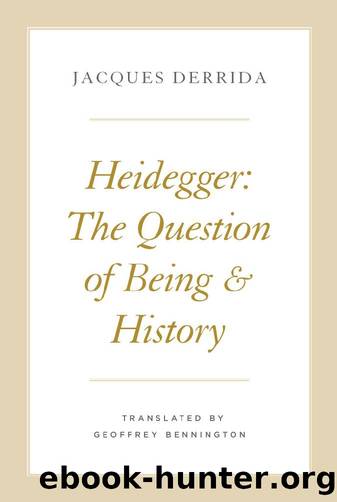Heidegger: The Question of Being and History (The Seminars of Jacques Derrida) by Jacques Derrida

Author:Jacques Derrida [Derrida, Jacques]
Language: eng
Format: epub
ISBN: 9780226355252
Publisher: University Of Chicago Press
Published: 2016-06-15T23:00:00+00:00
Such would be the objection. To which Heidegger replies that the Gegebenheit is perhaps here the Verführung itself, that the being-given is perhaps the ruse, the seduction that se-duces, that leads off the path (Verführung), that seduces (i.e., that separates one from the right path, that dupes me); the so-called self-evidence of what is given is perhaps here the dissimulation and the evasion itself. An essential evasion that has its basis precisely in the being of Dasein as the power to hide or alienate itself, to say âIâ even and perhaps especially when it is not the âIâ that has itself in its sights or is speaking itself.
Letâs translate:
In the present context of an existential analytic of factical Dasein, the question arises whether the Iâs mode of givenness (Gebung) which we mentioned discloses Dasein in its everydayness, if it discloses it at all. Is it then apriori self-evident that the access to Dasein must be a simple perceiving reflection [vernehmende = translated as âspéculationâ by Boehm and de Waelhens. It means a reflection in theory, that looks or listens or attends . . .] of the I of acts [das Ich von Akten = as the pole or actor of its acts]? What if this kind of Selbstgebung [of givenness of self: a Husserlian notion] of Dasein were to be a Verführung of the existential analytic [a seduction, a tempting distraction for the existential analytic, and in truth a transcendental seduction] and to [183] do so in a way grounded in the being of Dasein itself? Perhaps when Dasein addresses (Ansprechen) itself in the way which is nearest to itself, it always says âI am itâ (ich bin es), and finally says this most loudly when it is ânotâ this being. What if the fact that Dasein is so constituted that it is in each case mine [its Jemeinigkeit] were the reason for the fact that Dasein, initially and for the most part, is not itself? What if, with the approach mentioned above, the existential analytic fell into the trap, so to speak, of starting with the Gegebenheit of the I for Dasein itself and its obvious self-interpretation? What if it should turn out that the ontological horizon for the determination of what is accessible in simple giving should remain fundamentally undetermined? We can probably always correctly say ontically of this being that âIâ am it. However, the ontological analytic which makes use of such statements must have fundamental reservations about them. The âIâ must be understood only in the sense of a noncommittal [unverbindlichen: non-binding, neutral] formal indication of something which perhaps reveals itself in the actual phenomenal context of being as that beingâs âoppositeâ [i.e., as the opposite of the very thing it gave itself or said itself to be]. Then ânot Iâ [the opposite] by no means signifies something like a being which is essentially lacking âI-hoodâ(Ichheit), but means a definite mode of being of the âIâ itself; for example, having lost itself (Selbstverlorenheit). (Being and Time,
Download
This site does not store any files on its server. We only index and link to content provided by other sites. Please contact the content providers to delete copyright contents if any and email us, we'll remove relevant links or contents immediately.
| Deconstruction | Existentialism |
| Humanism | Phenomenology |
| Pragmatism | Rationalism |
| Structuralism | Transcendentalism |
| Utilitarianism |
The remains of the day by Kazuo Ishiguro(8975)
Tools of Titans by Timothy Ferriss(8365)
Giovanni's Room by James Baldwin(7329)
The Black Swan by Nassim Nicholas Taleb(7107)
Inner Engineering: A Yogi's Guide to Joy by Sadhguru(6785)
The Way of Zen by Alan W. Watts(6601)
Asking the Right Questions: A Guide to Critical Thinking by M. Neil Browne & Stuart M. Keeley(5759)
The Power of Now: A Guide to Spiritual Enlightenment by Eckhart Tolle(5752)
The Six Wives Of Henry VIII (WOMEN IN HISTORY) by Fraser Antonia(5498)
Astrophysics for People in a Hurry by Neil DeGrasse Tyson(5182)
Housekeeping by Marilynne Robinson(4436)
12 Rules for Life by Jordan B. Peterson(4299)
Double Down (Diary of a Wimpy Kid Book 11) by Jeff Kinney(4261)
Ikigai by Héctor García & Francesc Miralles(4246)
The Ethical Slut by Janet W. Hardy(4242)
Skin in the Game by Nassim Nicholas Taleb(4239)
The Art of Happiness by The Dalai Lama(4125)
Skin in the Game: Hidden Asymmetries in Daily Life by Nassim Nicholas Taleb(3991)
Walking by Henry David Thoreau(3953)
